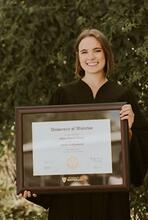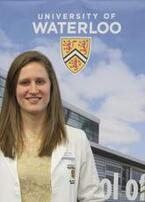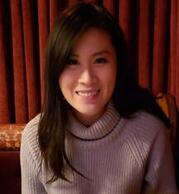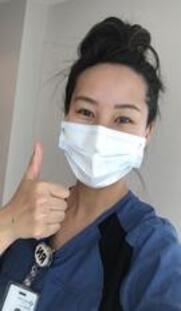Classes and exams moved online. Convocation celebrations postponed. Anxiety about the future. Yet, despite the uncertainty our students are experiencing in the wake of the pandemic, many of them have put their concerns aside to help others, in ways both large and small. Here are just a few of their stories.
A gift that grows
 Working on her externship in rural Oklahoma, graduating student Olivia Young had to rush to get home before the US/Canada border closed. She drove sixteen hours to her home in Thunder Bay; once home, she went into quarantine.
Working on her externship in rural Oklahoma, graduating student Olivia Young had to rush to get home before the US/Canada border closed. She drove sixteen hours to her home in Thunder Bay; once home, she went into quarantine.
Olivia decided to put her time at home to good use. She began making cloth face masks to help protect people in her hometown of Thunder Bay.
Olivia donates her time and all materials. Instead of payment, she asks for donations to Roots to Harvest, a local youth employment program. The program teaches young people job skills while they learn to produce food sustainably; the food grown is then shared through community-based charities, helping even more people.
So far, Olivia has raised more than $4,000 for Roots to Harvest.
“I chose to donate to this organization because they are ensuring food access to those in need during this state of emergency,” Olivia says.
Caring for caregivers
 First-year student Michaela Hellinga is a member of the McMaster Healthcare Students COVID-19 Response Team, which includes Waterloo pharmacy and optometry students. These volunteers provide services, such as babysitting, pet care and grocery runs, to frontline healthcare workers in the Waterloo, Hamilton and Niagara regions.
First-year student Michaela Hellinga is a member of the McMaster Healthcare Students COVID-19 Response Team, which includes Waterloo pharmacy and optometry students. These volunteers provide services, such as babysitting, pet care and grocery runs, to frontline healthcare workers in the Waterloo, Hamilton and Niagara regions.
The Response Team matches healthcare workers with volunteers based on volunteer’s availability, transportation, location and interests. Michaela was matched with a family in Kitchener and picks up groceries for them, dropping them off on their front porch and communicating with them through their doorbell camera.
“It’s a small thing, but if I can help provide the necessities so they can concentrate on what they have to do, I feel like I’m doing my part,” she says.
Building eye care resources online
 Once the pandemic started, many students stopped seeing patients, and labs and lectures were also cancelled,” says fourth-year student Diana Nguyen. “During this period of uncertainty, I knew I had to do something to connect and bring the optometry community together and to keep moving forward in learning.
Once the pandemic started, many students stopped seeing patients, and labs and lectures were also cancelled,” says fourth-year student Diana Nguyen. “During this period of uncertainty, I knew I had to do something to connect and bring the optometry community together and to keep moving forward in learning.
 Diana co-launched and launched two eye care information projects ─ an educational web resource called eyeX and an online community for patients with dry eye disease. Initially, Diana began co-hosting webinars with Drs. Richard Maharaj, Faran Vafaie and Karanveer Kamra on topics such as dry eye, glaucoma, specialty contact lenses and binocular vision. Through collaboration with both optometrists and ophthalmologists, these webinars have grown into the eyeX website, which sees visitors from across North America and Europe.
Diana co-launched and launched two eye care information projects ─ an educational web resource called eyeX and an online community for patients with dry eye disease. Initially, Diana began co-hosting webinars with Drs. Richard Maharaj, Faran Vafaie and Karanveer Kamra on topics such as dry eye, glaucoma, specialty contact lenses and binocular vision. Through collaboration with both optometrists and ophthalmologists, these webinars have grown into the eyeX website, which sees visitors from across North America and Europe.
 Diana has also begun to create information resources for patients through @MyDryEyeSpace, an online community specifically for patients with dry eye disease, a common and debilitating condition. She writes educational blogs and interacts with patients on Instagram, Facebook and YouTube. She also helps connect patients with optometrists who specializes in dry eye disease.
Diana has also begun to create information resources for patients through @MyDryEyeSpace, an online community specifically for patients with dry eye disease, a common and debilitating condition. She writes educational blogs and interacts with patients on Instagram, Facebook and YouTube. She also helps connect patients with optometrists who specializes in dry eye disease.
Now more than ever, people are searching online for medical information. Unreliable resources can be found on the internet and it can further perpetuate patient anxiety and cloud their judgement on diagnosis and treatment”, says Diana. “They need an online space that is patient-friendly, patient-focused and patient-centered and helps them find the answers they need.
A duty to serve
 There was a point when graduating student Naomi Kwong considered giving up her nursing license. Once she began her fourth-year clerkships, she thought, she’d never use it again. Then COVID-19 struck and Naomi traded her white coat for scrubs.
There was a point when graduating student Naomi Kwong considered giving up her nursing license. Once she began her fourth-year clerkships, she thought, she’d never use it again. Then COVID-19 struck and Naomi traded her white coat for scrubs.
With her clerkship placement cancelled and the pandemic spreading across Canada, Naomi felt compelled to answer the call for healthcare workers in Alberta, where she’s licensed as a registered nurse. She’s now working at an Edmonton hospital until there’s a set date for the OEBC OSCE.
“COVID-19 is no joke,” she says. “I didn’t realize how bad it was until I arrived for my first shift. Those who unfortunately get really sick from COVID-19 deteriorate so quickly and there’s often nothing you can do but be by their side.”
The sadness of working with critically ill people who are isolated from the comfort of their families also weighs on those who care for them. But in the midst of fatigue and grief, Naomi says she’s learned some valuable lessons.
“I’m constantly reminded what a privilege it is to work in healthcare. Although life will never be the same again, COVID-19 is a reminder for us to never take for granted good health and the simple joys of life.”
And for her optometry classmates, she has a message of encouragement.
“Regardless of where you are and what your circumstances are, know we’re in this together. I encourage you to find ways to stay healthy, stay positive, and be productive so that when this is all over, we’ll be ready—more than ever—to go out there and be amazing eye care providers. We will make it through this.”




